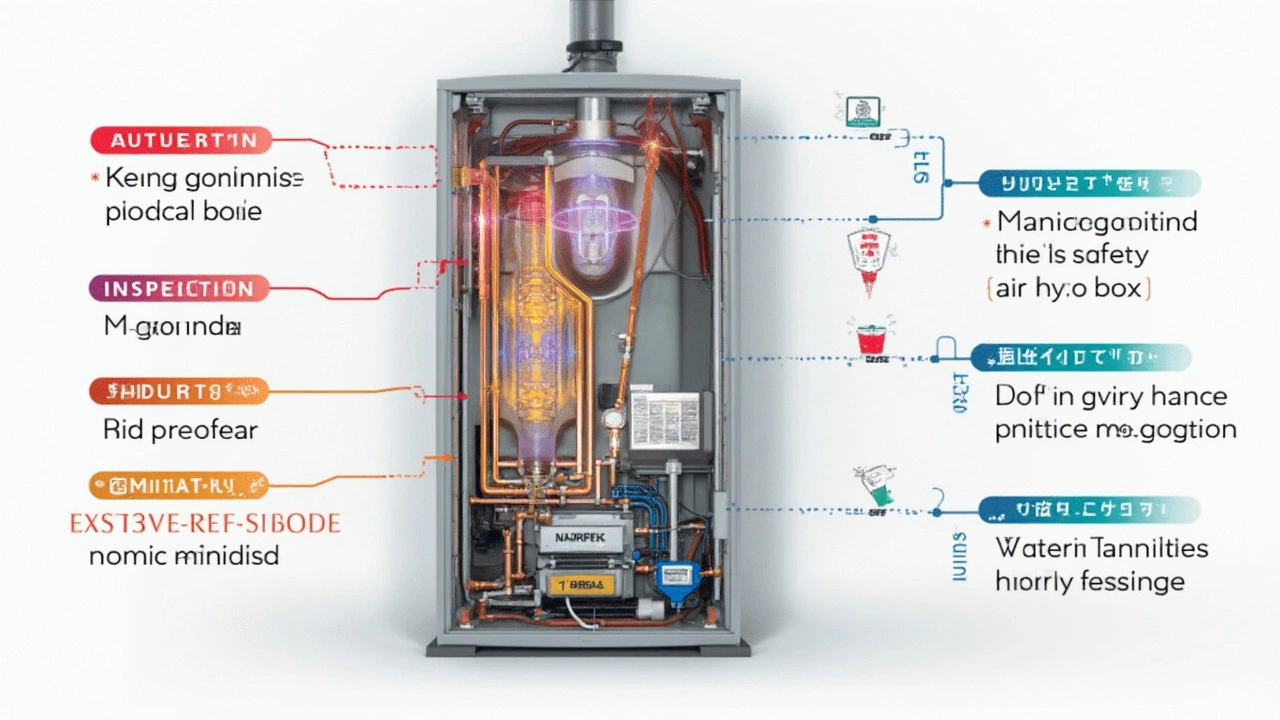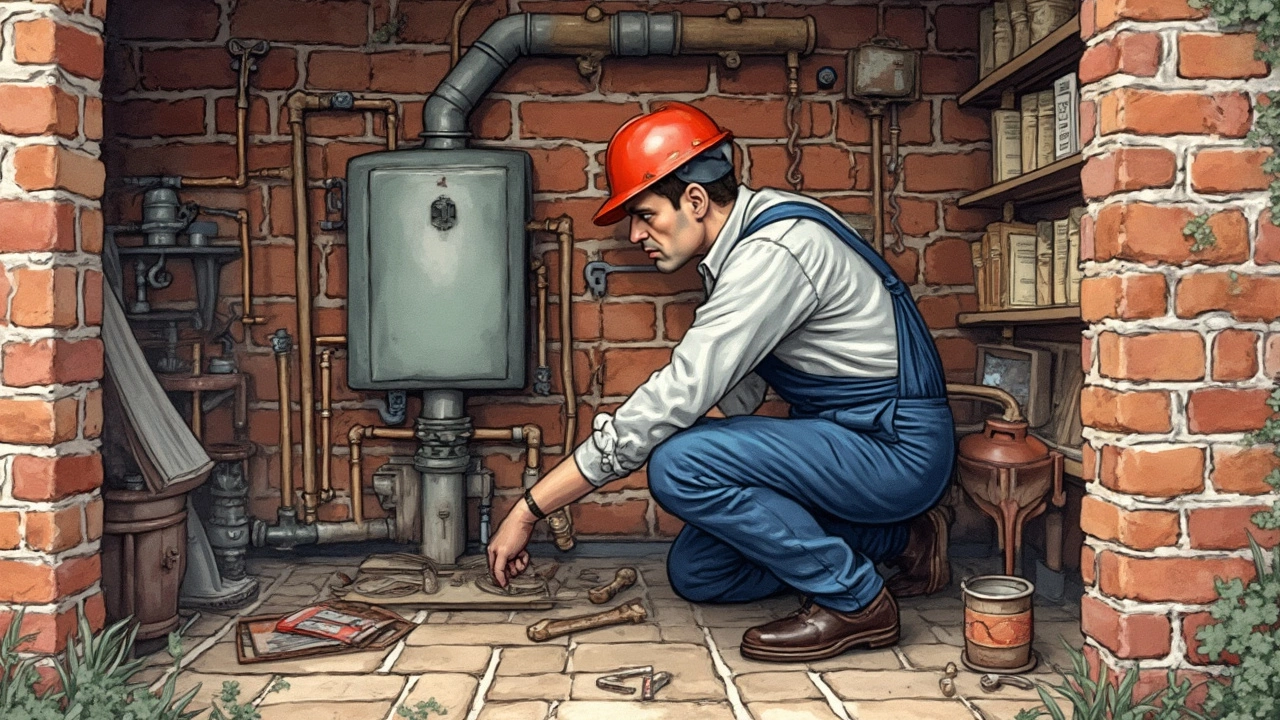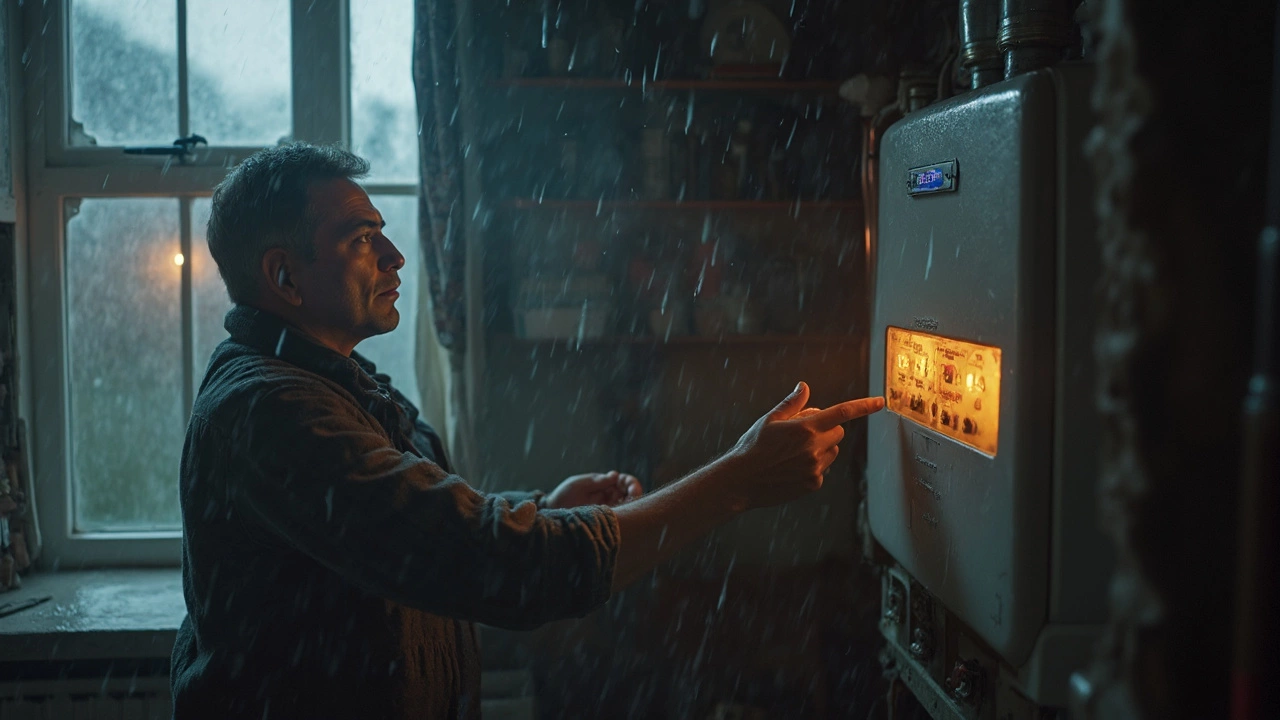
- 15 Jun 2025
- Gideon Thornton
- 0
Think getting your boiler serviced is just another thing to tick off the list? Actually, what happens during that visit could save you from chilly nights, headaches over sudden breakdowns, and even serious safety risks. Since your boiler is working hard behind the scenes, giving it regular attention is a no-brainer if you want stress-free heating.
The engineer doesn't just show up, poke it with a screwdriver, and leave. A thorough boiler service has a clear structure. Everything from gas leaks to pressure checks—and even a careful look at the flue for blockages—gets covered. They’ll strip down the components (like burners and heat exchangers), clean out built-up grime, and double-check every safety device is working as it should.
Did you know most boiler warranties require at least one service a year? Skip this, and you might be paying out of pocket for repairs that would otherwise be free. Plus, catching issues early means you won’t get hit by a huge bill when it finally refuses to turn on during a cold snap. It’s less about ticking a box and more about keeping things safe, efficient, and wallet-friendly.
- Why Servicing Your Boiler Is Non-Negotiable
- What's Checked During a Standard Boiler Service
- Safety Features: What Pros Inspect
- Efficiency Boost: Cleaning and Tuning Explained
- Common Boiler Issues Spotted Early
- Tips to Get the Most From Your Boiler Service
Why Servicing Your Boiler Is Non-Negotiable
Most people don’t think about their boiler until it stops working, but that’s usually when you run into the biggest headaches. Getting your boiler service booked each year isn’t just about following the rules—it’s about keeping your home safe, your bills manageable, and your mornings warm all winter long.
First off, boilers can develop faults silently. Carbon monoxide leaks, for example, are a real risk if boilers go unchecked, and CO is both odorless and deadly. The NHS records several hundred CO poisoning cases a year in the UK, most of which could be prevented with regular checks.
- Safety first: Annual servicing flags gas and carbon monoxide leaks before they become life-threatening. Even minor issues can sometimes turn serious without warning.
- Energy bills: A clean, finely-tuned boiler runs more efficiently. On average, regular servicing can lower your heating costs by up to 15% per year, according to the Energy Saving Trust.
- Warranty: Most manufacturers demand an annual service to keep your warranty valid. Forget this, and you might have to pay for expensive repairs yourself.
- Breakdowns: Engineers spot worn parts and prevent surprise breakdowns, especially when temperatures hit freezing—exactly when you want the boiler working flawlessly.
If you like hard facts, here’s a simple summary of how servicing impacts home safety and costs:
| Reason | Potential Outcome |
|---|---|
| Service Skipped for 1+ Years | 60% more likely to face a boiler breakdown |
| Missed Carbon Monoxide Leaks | Risk of illness or death; increased emergency repairs |
| Energy Efficiency Unchecked | Up to £200/year higher heating bills |
| Lapsed Warranty | No cover for repairs or replacement costs |
So yes, skipping an annual check can make you pay more for heat, fixes, and even risk your health. Just one visit a year usually dodges the worst of these problems—and keeps things ticking calmly along.
What's Checked During a Standard Boiler Service
If you've ever wondered what happens when an engineer comes to service your boiler, here's the real deal: it’s not just a quick look and a tick on a clipboard. A proper service digs deep into the inner workings of your heating system to make sure everything’s solid, safe, and efficient.
The main steps in a standard boiler service usually look like this:
- Visual Inspection: The engineer checks for obvious signs of damage, leaks, or corrosion. They’ll look around the whole unit and connected pipework for anything that seems off.
- Flue and Combustion Check: They inspect the flue (the pipe that vents gases outside) for any blockages or leaks. A faulty flue can leak carbon monoxide, so this is a non-negotiable step.
- Gas Pressure and Flow Test: They check if the gas is coming in at the right pressure and if it flows properly through the system.
- Safety Device Test: All the boiler’s built-in safety mechanisms—like the pressure relief valve and thermostat—are tested to make sure they'll actually kick in if there’s ever a problem.
- Internal Component Check: The engineer opens the casing and checks parts like the burner, heat exchanger, and spark sensor for signs of wear or blockage.
- Cleaning: Components are cleaned where needed. Gunk on the burner can make your boiler less efficient, so a clean can give your unit a new lease on life.
- Seals and Joints: All seals and joints are checked for leakage or damage.
An engineer will also fill out a full service record—handy to have for your warranty and if you ever rent or sell your home.
What really stands out is how much is caught early. For instance, most engineers use a flue gas analyzer, a tool that measures how well your boiler’s burning fuel. Poor readings can tip you off to problems like dangerous gas leaks or blocks that you’d never spot yourself.
| Check | Why It Matters |
|---|---|
| Gas Pressure | Prevents under- or over-firing, which can damage the boiler |
| Flue Blockages | Stops dangerous gases from backing into your home |
| Burner Cleanliness | Improves efficiency and prevents breakdowns |
| Leaks/Corrosion | Spots issues before they become big problems |
| Carbon Monoxide Levels | Keeps your home safe from invisible and deadly leaks |
If you hear the engineer fiddling with a toolbox and running tests, that’s a good sign—they’re being thorough. Don’t be afraid to ask what’s being checked and why. A decent engineer will talk you through it, and you’ll get to know your heating setup a whole lot better.
Safety Features: What Pros Inspect
When a professional comes for your boiler service, safety checks take center stage. Nobody wants a faulty boiler putting their home or family at risk, so these inspections are dead serious. The engineer starts by scanning for carbon monoxide leaks—a sneaky, invisible threat. Even a small leak can build up and cause headaches, dizziness, or worse.
Gas safety is another biggie. Technicians use a gas analyzer to make sure there are no leaks and the gas pressure meets the manufacturer’s recommendations. If your boiler runs on oil or LPG, the checks are tweaked to suit those fuels too.
They’ll also check the flame sensor (basically making sure your burner is lighting and staying lit the way it’s supposed to) and inspect safety cut-off devices. These are the little heroes that shut everything down if the boiler overheats or the pressure goes wild.
- Carbon monoxide test: Checks for any leaks in the system.
- Gas tightness test: Ensures there’s no leaking gas around any connections.
- Pressure relief valve test: Makes sure the valve releases when it’s supposed to, preventing dangerous build-ups.
- Flue and ventilation check: Ensures toxic gases safely leave your home and nothing’s blocked up.
- Thermostat and sensor checks: Guarantees the safety controls respond quickly if something’s wrong.
Here’s a quick look at how often problems come up, based on recent UK heating industry stats:
| Safety Feature Failed | Percentage of Faulty Boilers (UK, 2023) |
|---|---|
| Flue Blockage | 19% |
| Pressure Relief Valve Fault | 9% |
| Gas Leak Detected | 2% |
| Faulty Safety Cut-off | 4% |
| Carbon Monoxide Leak | 1% |
If any of these checks fail, the engineer won’t just cross their fingers and walk out. They’ll either fix the issue on the spot or shut things down until it’s sorted, so your home isn’t running on borrowed time. Always ask your engineer for a quick run-down of what they found; a five-minute recap could mean peace of mind all year.

Efficiency Boost: Cleaning and Tuning Explained
Most people don’t think a little dirt makes much difference, but your boiler sure notices. When dust, soot, or old gunk builds up inside, the system works harder, wastes energy, and sometimes just quits for no good reason. That’s why cleaning is a main part of every boiler service—it’s not just for show.
During cleaning, the engineer gets right inside the heat exchanger, burners, and fans. Any carbon deposits are carefully cleared out, because even a thin layer reduces heating performance. Imagine breathing through a paper towel all day—same idea for your boiler when it’s clogged. Even minor blockages force your boiler to guzzle more gas to get the same heat, which means higher bills for you.
Once it's clean, the tuning starts. Engineers check and adjust things like gas-to-air ratios, ignition settings, and water pressure. These tweaks are no guesswork—they're based on actual measurements and manufacturer specs. Tuning keeps your boiler running at its official efficiency rating (most modern types aim for over 90%), instead of slipping into expensive, sluggish territory.
Here’s a quick look at what cleaning and tuning can save you:
| Boiler Age | Typical Efficiency Before Service | Potential Efficiency After Service |
|---|---|---|
| Under 5 years | 88-91% | 90-93% |
| 5-10 years | 83-87% | 88-91% |
| 10+ years | 76-82% | 82-87% |
If you’ve noticed lukewarm radiators, weird noises, or your gas bill creeping up, tune-ups usually fix that. Besides avoiding wasted energy, regular boiler cleaning and tuning can help your system last much longer—some folks get 15 years or more. That’s a decent payoff for an annual checkup.
- Ask the engineer what condition your main components are in after every service.
- Check when your last cleaning was—if it’s been over a year, book it now.
- Don’t ignore grime or odd smells; those mean your boiler is shouting for attention.
Common Boiler Issues Spotted Early
One major pay-off from a boiler service is catching problems before they turn your place into a fridge. When a pro goes through the whole system, they're looking for stuff that often goes bad way before you notice any real drop in warmth or hot water pressure. Let’s break down some common issues engineers usually spot early on.
- Leaks and Drips: Even the tiniest water leak can spell big trouble, from rust to damaged wiring. Sometimes, leaks come from worn seals or a cracked heat exchanger. These often start small, so you might not notice until the floor is wet or the pressure gauge keeps dipping.
- Pressure Drop: Losing pressure is a classic symptom. It can be down to hidden leaks or an expansion vessel that’s lost its charge. If the engineer spots this during a service, it’s easier and cheaper to fix than if your system shuts down on a cold night.
- Pilot or Ignition Failures: Modern boilers don’t have pilot lights anymore, but if the ignition is dirty or worn, your heating won’t kick in. Engineers check these connections so you avoid those annoying mornings with no hot shower.
- Soot and Debris: Blocked burners or flues collect soot, which cuts efficiency fast and can even cause carbon monoxide leaks. During the service, getting rid of this build-up is top priority.
- Thermostat Issues: Faulty thermostats mess with the whole heating schedule. Pros will compare boiler and room readings and spot dodgy sensors before they mess up your comfort—or your bill.
- Noise (Kettling): If your boiler sounds like a boiling kettle, lime scale might be clogging things up. Early diagnosis means just descaling, rather than shelling out for new parts.
People are often surprised by how much an engineer can find in just an hour. Take a look at this table showing the most common faults spotted early during a yearly service:
| Issue Found | How Often Found (per 100 Services) | Typical Fix |
|---|---|---|
| Minor Leaks | 18 | Seal replacement, tightening joints |
| Pressure Problems | 25 | Top up, vessel or valve checks |
| Ignition Issues | 14 | Clean or replace igniters |
| Debris Build-up | 30 | Cleaning/flushing system |
| Thermostat Errors | 9 | Sensor adjustment or replacement |
The bottom line: Spotting these issues early can save you loads—about £150 on average compared to waiting until the boiler totally conks out. Early fixes also mean way less disruption at home and a warmer, safer winter for everyone.
Tips to Get the Most From Your Boiler Service
Want to make your boiler service count? It’s pretty simple, and a bit of prep goes a long way. Engineers actually appreciate it, and you’ll get a better look at how your system’s doing—maybe even save money down the line.
- Clear the Area: Make sure the engineer can get to your boiler. Move any laundry, cleaning stuff, or storage boxes. It speeds up the job, and they’re not tripping over your gym bag.
- Check Your Warranty: Most brands (like Worcester Bosch and Vaillant) require yearly servicing to keep the warranty valid. Have your boiler’s paperwork ready, so you get the official stamp.
- Note Down Issues: Heard weird noises? Radiators not heating up? Write a list of these before the visit. Sharing these details means the engineer can zero in on real problems, not just do a standard check.
- Request a Service Record: Always ask for a signed and dated service sheet. Not only is this proof for warranties, but it also helps if you ever sell your home. A boiler with a service history can actually up your property value.
- Know Your Engineer: Your engineer should be Gas Safe registered (in the UK), which is easy to double-check online. Anyone legit will always show you their ID if you ask.
Boiler services aren’t usually pricey, but costs do vary. Here’s a quick look at averages recorded across the UK in early 2025:
| Service Type | Average Cost (£) |
|---|---|
| Standard Annual Service | 90 |
| Full Service with Safety Certificate | 120 |
| Boiler Repair (if needed) | 150+ |
Small details—like knowing where your stopcock is or having kids and pets out of the room—make the visit smoother. And after the service? Give the boiler a few days and see if those lingering problems disappeared. If not, call the engineer back—most reputable ones won't charge for a return fix right after a service. Staying on top of these little things keeps your boiler happy, safe, and purring along when you need it most.




